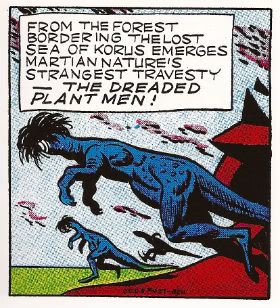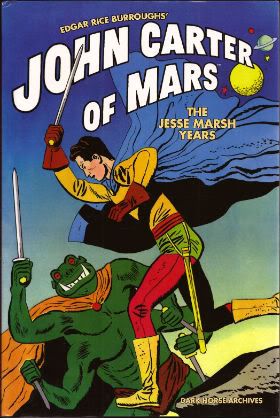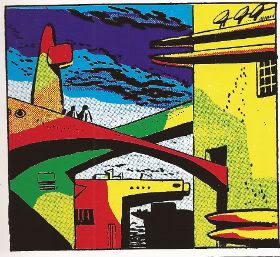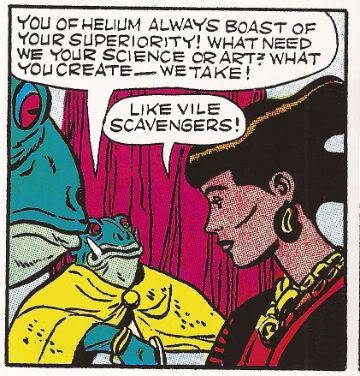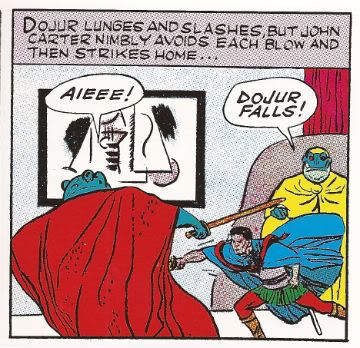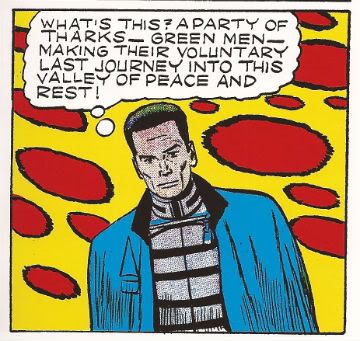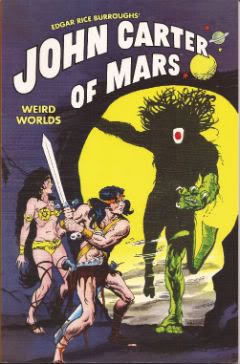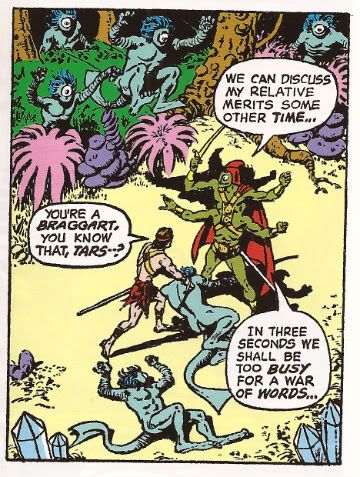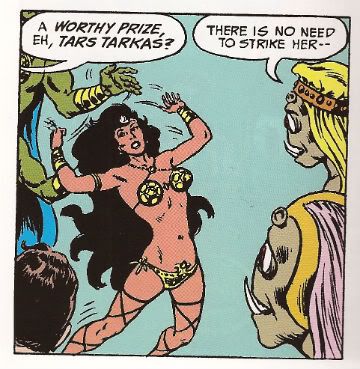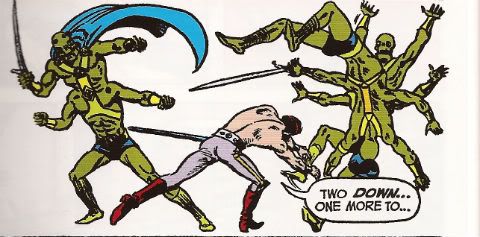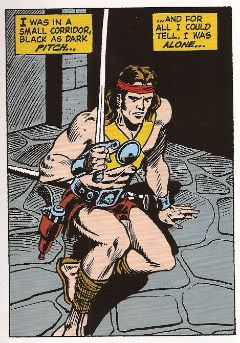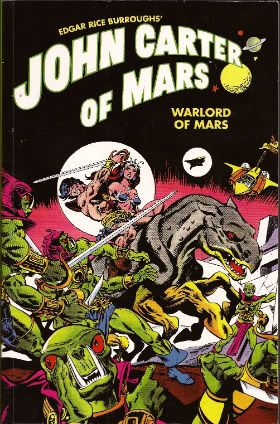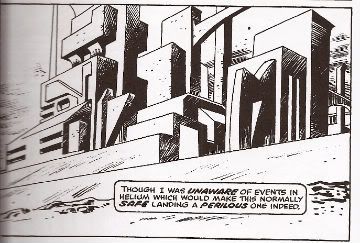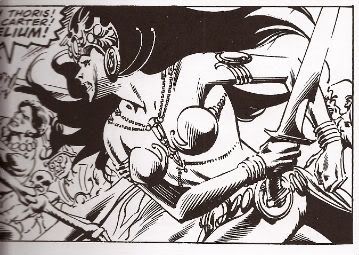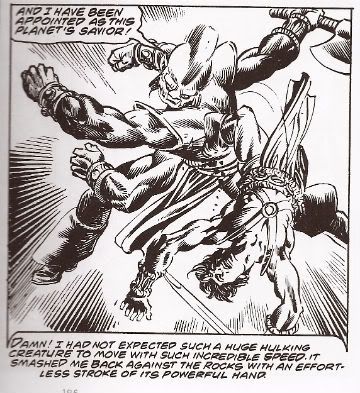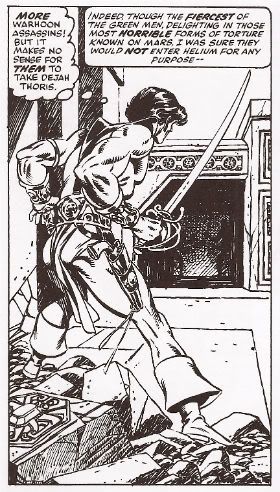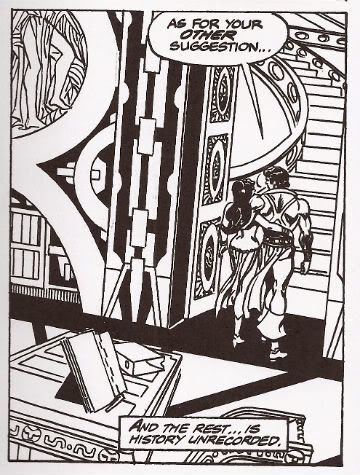 My name is John Kane and if my instructions have been honoured then what now assails your minds will be a continuation of the unfeasible events that occurred when I persisted in following the course of John Carter comics into the current Century. It is not for such as I to grant such an endeavour any merit for such a task can only fall to those who suffer the results. My chore has ended and yours has only begun...
My name is John Kane and if my instructions have been honoured then what now assails your minds will be a continuation of the unfeasible events that occurred when I persisted in following the course of John Carter comics into the current Century. It is not for such as I to grant such an endeavour any merit for such a task can only fall to those who suffer the results. My chore has ended and yours has only begun...
WARLORD OF MARS #1 - #14 (of an ongoing series)
Art by Stephen Sadowski, Lui Antonio, Edgar Salazar
Written by Arvid Nelson
Coloured by Adriano Lucas, Shane Rooks, Maxflan Araujo, Marcello Pinto
Lettered by Troy Peteri, Marshall Dillon
Based on the stories by Edgar Rice Burroughs
(Dynamite Entertainment, $3.99ea (except #1 which was $1.00))
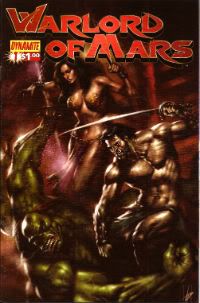
Previously on 'An Old Man Talks Uninformed Shite About Comics No one Cares About' I discussed comics from 1952-3 and 1972-79 and went on about changes in comic storytelling between the '50s and the '70s. But only in a general way; not in a way that's going to suggest the presence of any original thought or anything. I was pretty happy to report that comics had come on a bit in terms of technique but what about by 2010 when this Dynamite series began? That'd be roughly 60 years since the Jesse Marsh Stuff and, say, around 30 years since the DC/Marvel stuff ended. Those numbers making up in roundness what they lack in precision, somewhat akin to a large boned gentleman's reflection in a fun-house mirror.
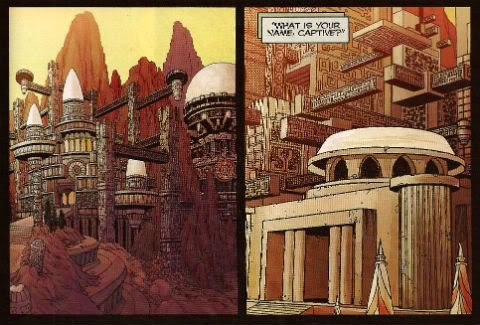 Mars circa 2010.
Mars circa 2010.
It takes this series 9 issues to adapt A Princess of Mars. That's a fact. Another fact is the same ERB book was adapted by Dell and Marvel in one issue. Okay those adaptations are hardly the most elegant of things but they are certainly entertaining and have momentum. So, no, they probably aren't as rich an experience as reading the novel but they are quite a good experience as far as reading a comic goes. To pack all that stuff into one issue some pretty brutal choices have to be made about what to include and where the narrative emphasis should lie. Even though the Dynamite series has room to sprawl about the place like a boneless teenager choices have also been made. I haven't read the original ERB novels but thanks to this pointless task I have set myself I have now read no less than 5 (FIVE!!!) comic book adaptations of A Princess of Mars. None of these are exactly the same in either events or tone. In every case decisions have been made.
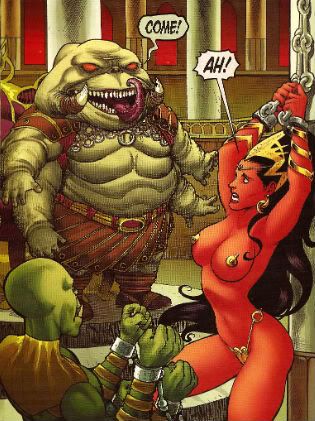 The Incomparable Dejah Thoris circa 2010
The Incomparable Dejah Thoris circa 2010
Tellingly the Dynamite series is touted as an "expansion of the sci-fi classic". So the fact it takes a whole heck of a lot longer to cover the same ground as previous adaptations is unsurprising. What is surprising is the time taken to get John Carter onto Mars. In the Dell series JC is on Mars by p.2, in the DC series he's there on p.5 while the Marvel series starts with him already there up to his cute tuchus in trouble! In 2010 (now sit down and have someone nearby ready to call the emergency services before you read this next bit) John Carter manifests on Mars on the 1st page of the...THIRD issue.
The only real reason to stick with a series clearly sold as being about a man having robust frolics on Mars for three issues in which his frolics are neither robust nor Mars-based is if you are a fan of ERB (or pulp) already. So, yeah, pretty much two of my least favourite modern tendencies (as in suicidal) in comics: no attempt to appeal to new readers and decompression. Stylistically this latter would be the biggest difference to have occurred in the 60 some years separating the Dell and Dynamite material. The boon of having plenty of room to spread any artistic wings is pissed away due to a lack of inclination to do so in a way which is constructive and a maddening tendency to prevaricate. But it's okay for modern comics to do that because the audience isn't going anywhere is it? Well, I guess I'm looking at different sales figures because that audience certainly seems to be going somewhere.
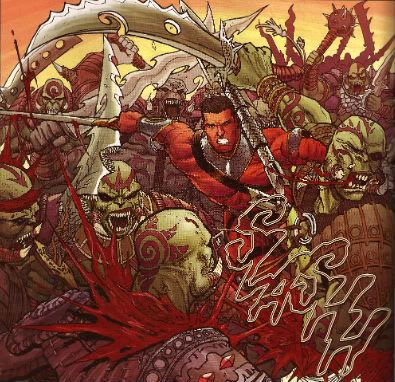 Mars Action circa 2010.
Mars Action circa 2010.
(About decompression. Now, I'm aware that decompression can be a valid literary device but I am also aware that the term is often invoked in order to lend legitimacy to what is clearly better described as taking the piss. Language is quite a powerful thing and I think it is time we reclaimed "decompression" from those who abuse it to the furtherance of fluffing up both their own and their audience's egos. Next time you see the word 'decompression' try mentally replacing it with 'taking the piss'. I think the results will delight you! (Note: unless you are a diver in which case I suggest you stick to 'decompression'.))
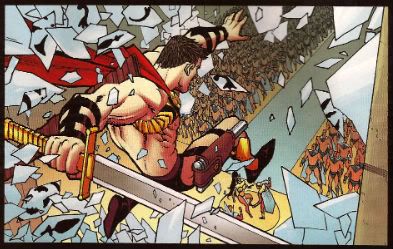 John Carter circa 2010.
John Carter circa 2010.
Now those are harmful inclinations but they are hardly unique to this comic (which is why they are so especially infuriating) and to judge this series on those grounds alone would be unfair. It's not a bad little series. There's evidence that some thought has gone into the presentation of the material. The narration is presented in a typeface akin to that in a words-alone book, there's some attempt at supplementary material intended to evoke the "true story" aspect of the original novels and the choice to up the ante on the tits'n'gizzards has clearly been made at an early stage. And, like a Calot returning to its own vomit, it's this I'd like to look at again.
You could be forgiven for believing that I am some kind of sweaty one-handed reader who won't be satisfied until all comics resemble nothing so much as a fiesta of fur and quivering meat but this isn't the case. I just think you should show commitment to things. Commitment is a big thing in my household. I know my Incomparable partner is always trying to get me committed. Particularly after reading one of these things. But although there is more gore and more nekkidery than in any previous iteration of this here ERB IP, it's all a bit half-assed. People like the nudey-roo aspect to this stuff so: John Carter does at least have the (in)decency to be swinging in the wind initially, the incomparable Dejah Thoris is unlikely to suffer from rashes due to her detergent, and then there are those "risque" covers. But... John Carter has to contort himself comically to avoid a glimpse of his carrot and taters, the incomparable one is too often shown quailing or threatened and those covers are censored. There just doesn't seem to be much point to it really. If you're going to get down there then get down and roll around, I say. After all, it isn't as if Dynamite are in thrall to the demands of the ERB estate is it? Which reminds me:
 Martian irony circa 2010.
Martian irony circa 2010.
There are three different artists throughout the course of the book so far. Initially it's Stephen Sadowski and I'll just say that if you're having cowboys in your book it's probably best get people who can draw hats on people's heads. I know it's not the easiest thing in the world and even Lovely Lou Fine wasn't very good at it, but still. Sadowski crops up later on and hilariously depicts the incomparable Dejah Thoris wearing more to bed than at any other point in the series. Sadowski's photo derived work bookends the contributions of Lui Antonio who has a nicely blocky approach that's kind of sub-Art Adams. It's clean, nice art but, unlike Art Adams, a little light on the details and Antonio has a tendency to give JC a big vein on each arm suggesting nothing so much as sword wielding phalli. Which could be entirely intentional but is surely unnerving. Salazar crops up in the later issues and I really don't like his brittle line, lacking as it does any confidence in itself and lending the book a hesitant and scratchy look. (Pulp should never be hesitant.) On words Nelson does a decent job. It all bustles along, things happen and it's entertaining enough with even a glimpse of humour here and there ("Kiss me, you Calot!"). He really earns his money with the second arc which is a kind of murder mystery without JC but starring his son and is, thus, about as satisfying as tuning into Scooby-Doo only to find it's an episode all about Scrappy. Still Nelson manfully manages to keep it rolling along and through into the latest issues where unfortunately, for this reader, his solid work is unable to distract from the eye-prickling art. Overall, since most of my quibbles and carps were aimed at modern comics generally rather than this one in particular, the series is OKAY!
WARLORD OF MARS: DEJAH THORIS #1 - #9 (of an ongoing series)
Art by Carlos Rafael
Written By Arvid Nelson
Coloured by Carlos Lopez
Lettered by Marshall Dillon
Based on the stories by Edgar Rice Burroughs
(Dynamite Entertainment, $3.99ea)
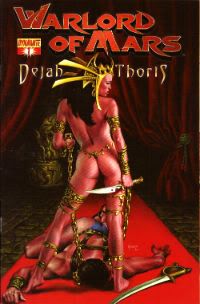
Ah. Yes. Another tendency in the modern genre comic scene is to milk that IP teat until it is sore. So here we have a solo title for The Incomparable One. These tales are set before John Carter turns up so The incomparable one is only a mere slip of a girl at this stage, probably barely in her 5th Century. Oh yes, from reading all these books I have learned that Martians are born from eggs, mature quickly and age slowly, live to be about 1,000 years old (unless someone stabs them or they are eaten by some of the more agile fauna) at which point they go off and commit unassisted suicide by the River Iss (a kind of more brutal Dignitas). Unsettlingly this means John Carter has shacked up with some old crone who lays eggs. This makes John Carter possibly the only fictional character who engages in procreation with a geriatric, suicidal monotreme.
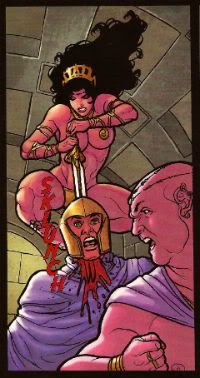 "...(s)he's an egg-laying mammal of action!.."
"...(s)he's an egg-laying mammal of action!.."
Unfortunately the reality of this series is entirely more conventional than the preceding would have you believe. (Pulp should never be conventional). Illustrated in a sub-Frank Cho style the art is clean and cartoony. Although both male and female Martians are both dressed quite minimally it's clear that The Incomparable Dejah Thoris is dressed more minimally than most. Since these stories are solid little genre adventures in which the main novelty is the fact that the lead character is a capable and independent lady equally comfortable politicking or shellacking they sound quite progressive. Progressive for mainstream genre comics anyway. Sadly this is somewhat undermined by the fact that The Incomparable Dejah Thoris is continually contorting herself to display her assets to their best advantage. This can be overlooked in action scenes due to their physical nature but the talking scenes are somewhat undermined by her tendency to present herself like a horny ape to some invisible suitor. The series is, however, in no way the kind of sordid disgrace that mainstream genre comics featuring partially robed ladies are inclined towards and is entertaining in a lurid and daft way. And in Pulp that is OKAY!
WARLORD OF MARS: FALL OF BARSOOM #1 - #2 ( of Four)
Art by Roberto Castro
Written by Robert Place Napton
Coloured by Alex Guimaraes
Lettered by Simon Bowland
Inspired by the stories of Edgar Rice Burroughs
(Dynamite Entertainment, $3.99ea)
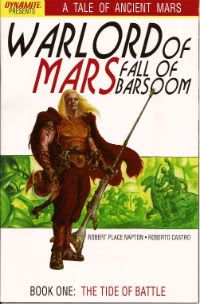
Or Palping The Teat Part Two. This comic is is set "100,000 years before John Carter arrived on Mars." That's ludicrous. Which is a shame as the thrice-named Napton delivers a decent three stranded pulp narrative that is only slightly undermined by decompression and generic dialogue. Roberto Castro is a bit too cross-hatchy for my tastes even going so far as to edge into Liefeldian which, since I am not one of those youngsters with their elder-baiting Liefeld-revisionism, is not a good thing for me. It's EH! which is not something that a spin-off title needs to be. What with WoM:DT and this we can see the third fatal tendency of the modern marketplace in full effect: dilution of the IP, over-saturation of the market, cutting off your nose to spite your face, call it what you will it's not good. Now Dynamite are publishing Not-Tarzan comics I am waiting with bated breath for Cheetah: Year One! filled with all the shit slinging, nit picking, teeth baring and frenzied humping fans of chimps all over the world have come to know and love. Seriously, "100,000 years before John Carter arrived on Mars." Christ.
JOHN CARTER OF MARS: A PRINCESS OF MARS #1 - #5 (of Five)
Art by Filipe Andrade
Written by Roger Langridge
Coloured by Sonny Gho
Lettered by VC's Cory Petit
Based on the works of Edgar Rice Burroughs
(Marvel Comics, $2.99ea)
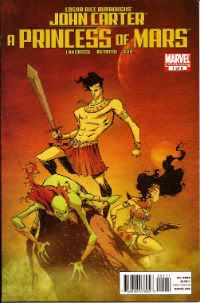
This was by far the best of the JC comics I read during this expensive and time consuming exercise in senseless self-flagellation. Roger Langridge's script is fast paced (JC's already on Mars when it starts), packed with well paced incident, brief suspensions of action to allow for the smaller, quieter scenes to occur and it's also a little bit tongue-in-cheek. It's good stuff but the humour doesn't quite sit right. In the merit column it does allow John Carter to actually appear to possess some form of personality. Such a thing hasn't really been in evidence in the comics prior to this. Pulp heroes not being noted for their rich (or indeed any) characterisation I can't say I'd really noticed until Langridge offered up an alternative. Usually John Carter is in love with Dejah Thoris, good at killing stuff and, er, generally upbeat. Here John Carter has a sense of humour as well. However, he appears to have Roger Langridge's sense of humour; which is okay as Roger Langridge is a funny man but isn't okay because, unless I missed something, Roger Langridge isn't a Virginian gentleman of the 1860's. So when John Carter makes jokes about mints on pillows, giving only his name rank and serial number or uses a particularly legendarily bad chat-up line it does tend to ruffle the reader's immersion in the doings.
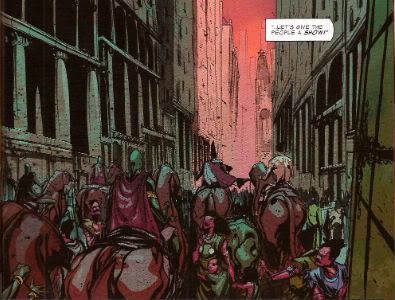 Mars circa 2011.
Mars circa 2011.
Mind you, the flashback sequence is brief and none too clear. It could very well be that the intention was to leave Carter's earthly origins vague to allow just such humour to be possible. It may be that I brought an ungodly amount of prior John Carter comics to bear on this series and got the wrong end of the stick. If I did, I apologise and I do at least concede that Langridge's humour is actually funny, which is probably the most important thing really.
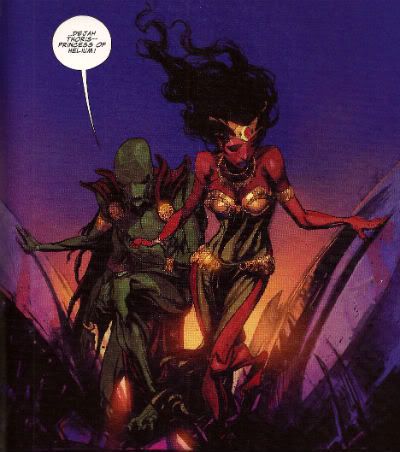 The Incomparable Dejah Thoris circa 2011
The Incomparable Dejah Thoris circa 2011
The series also dodges the problems with gore'n'genitals by opting to go the clean-cut route. This turns out to be a wise decision. The incomparable Dejah Thoris is well covered and so it is easier to believe John Carter is in actual fact in love with her as a person rather just in love with having her fine caboose ride his cock horse. That's nice. I can do romantic too. I can. Stop laughing.
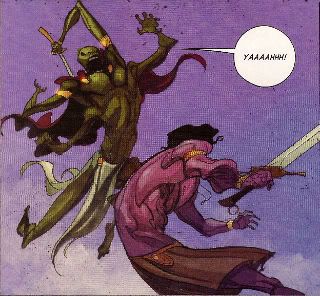 Mars Action circa 2011.
Mars Action circa 2011.
The violence is good and violent but not overdone. Thanks to Filipe Andrade's fine work the fight scenes are more suggestive than ham-handedly bloody. In fact Filipe Andrade's work on this is pretty great. It's like the designs on an Ancient Greek vase have come to life and started running around and having smashing adventures. It is visually stylish and arresting work that nicely embodies the archaic nature of both the setting and the source material itself while being visually inventive enough to appear startlingly fresh, particularly in comparison with the somewhat familiar styles of art present in the other modern day John Carter books. Filipe Andrade - I like him!
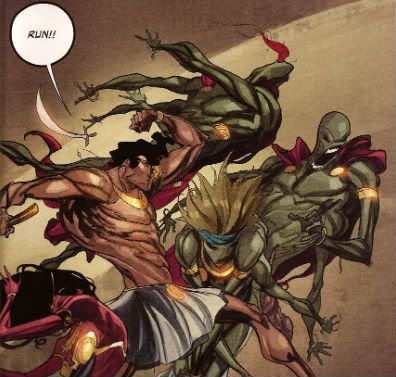 John Carter circa 2011.
John Carter circa 2011.
I was expecting the least from this one given it's origins but it just goes to show that you should always go on the talent rather than the publisher. (I have no idea why people have a loyalty to particular comics publishers. It baffles me.) Langridge rarely disappoints and continues not to here and Andrade is a lovely discovery for me. It isn't my ideal JC comic (That would be: cover by Corben, words by Lansdale, art by Veitch. Thanks for asking. Took you long enough.) but it ain't half bad. In fact I'll go up to VERY GOOD!
JOHN CARTER: THE WORLD OF MARS #1 - #4 (of Four)
Art by Luke Ross
Written By Peter David
Coloured by Ulises Arreola
Lettered by VC's Cory Petit
Based on characters created by Edgar Rice Burroughs and the screenplay JOHN CARTER by Andrew Stanton, Mark Andrews and Michael Chabon.
(Marvel Comics, $3.99ea)
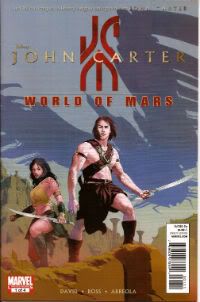
This one I regret to inform all is a blatant cash-grab that takes up four issues with what can generously be described as one issues worth of content. That's not to insult the creative team who I am sure enhance the lives of everyone they come into contact with. They've clearly been given the thankless task of providing a prequel to a film which by the very nature of the premise it is prequelling cannot actually feature the main character of said film or even allow the supporting characters to meet even though their adventures must have some connection. The real interest thus becomes seeing how Peter David will negotiate this thankless task. He has a good stab but the unavoidably inessential nature of the material is never in doubt, which really spoils the reading experience. Luke Ross' art is odd because he's really good at the bits that don't involve humans. He's got a nice thick line with a lovely crayon like effect that lends life and vigour to creatures that are clearly only of the imagination. Alas, his humans are stiff and overact and his landscapes are just photographs with minimal effects. Look, I'm tired of John Carter now so let's just say it was AWFUL!
So, 60 some years of John Carter comics there. I guess I should draw some conclusions? Up to 1979 there's one defining characteristic of the JC comics. The people involved seem to be having fun. Whether it's Jesse Marsh amusing himself by drawing works of art on the walls of his backgrounds, Sal Amendola outstripping his talent with his ambition or just the prurient purple prose of the Marvel stuff fun is clearly being had. It's an inclusive kind of fun, too.
There's less of this in the 21st Century stuff. Less enjoyment in both the form and the content. A lot of the time it just reads like it was work, a job. Which it was, of course. But equally so was the earlier stuff. That's why the Langridge/Felipe series seems so much brighter than all those series surrounding it. Heck, I'm sure everyone involved in all these comics had fun. There are probably interviews where they stress how much fun it was, how it engendered an almost obscene thrill to be involved in the expansion of his venerable ERB IP. There are always interviews alike that, about everything. What there aren't a lot of are comics that actually feel like they are interested in reaching out and including the audience in that fun. Look, I don't really know what pulp should be but I think it should be fun. Thankfully Roger Langridge and Felipe Andrade at least seem to agree.
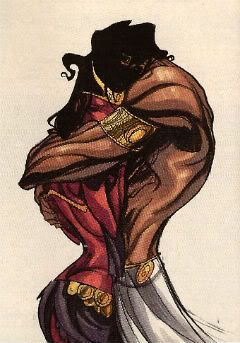
Now that I have fulfilled the instructions of my delusional relative and allowed the clearly addled fruit of his stunted tree of a mind to fall before your eyes but one task remains to me. For I shall tell you now that he directed that I remove his body to Yorkshire without embalming and that he be laid in a Mylar bag of unfeasible dimensions upon an acid free board of card of similar size, therein to be sealed with tape. Clearly the man was a fool of the first order but I did as bade and can testify with a true tongue that, to this day, although his body has yellowed around the edges somewhat he remains, these many years hence, still Mint to Near Mint. Remarkable indeed.
Yours very sincerely
ERB
Have a good weekend, all, and remember to read some COMICS!!!
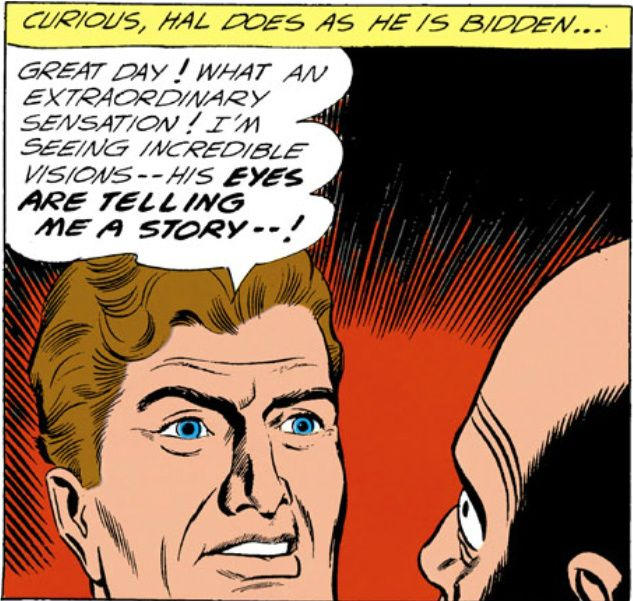 Apologies to those of you already pestered with this image on Twitter: I thought it was worth a re-use, in no small part because I must once again plead mentis mortis (I have no doubt I'm handling this dead language so poorly, a charge of necrophilia could well be leveled), thanks to how late it is that I'm composing this and where I'm at for a variety of reasons that will probably become clear once you hear Wait, What? 81 next week. (Hint: it's a terrifying topic Graeme and I have tackled before.)
Apologies to those of you already pestered with this image on Twitter: I thought it was worth a re-use, in no small part because I must once again plead mentis mortis (I have no doubt I'm handling this dead language so poorly, a charge of necrophilia could well be leveled), thanks to how late it is that I'm composing this and where I'm at for a variety of reasons that will probably become clear once you hear Wait, What? 81 next week. (Hint: it's a terrifying topic Graeme and I have tackled before.)


















